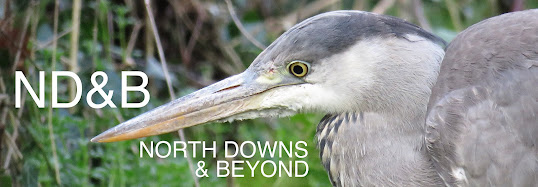Multi-tasking
This autumn has, so far, been underwhelming on the birding front. Sky-watching has failed to produce any notable movements, with thrush and finch numbers very low. My combing of the local fields and hedgerows has uncovered a lack - even a silence - of avian presence. It is, it must be said, depressing. What exacerbates this dearth of birdlife is that social media reveals that, elsewhere in the country, there are birders filling their boots with large numbers, variety and rarity. At times like this I am reminded that 'comparison is the thief of joy', so it is best to try not evaluate your own, albeit small successes, against what is going on elsewhere - there lies disillusionment, disappointment and madness. It is also a truism that such successes elsewhere are often localised, and increasingly only happening when weather conditions are ideal, which does not happen all that often.
So, my local birding experience is not going to be anything other than a regular diet of mediocrity unless the weather conditions conspire to create ideal visible migration conditions, be they for the arrival (and passing) of passage migrants; a hard-weather event; or an irruption on a nationwide scale (think Waxwing, Hawfinch etc). That might sound defeatist but then again our resident bird numbers are way down, so any normal day's birding is one that is going to be set against depressed numbers, something that I have been experiencing for some time now. However, with a bit of effort it is easy to pull yourself out of such negativity by trying to focus on the detail of what you are doing, such as accepting that by counting (and reporting) on what you do see it has enormous value in collectively being used to make sense of just what is going in with our birds.
You can also multi-task...
What do I mean by multi-task? Well, if you are out birding it is not only the birds that are on offer. There are butterflies, moths, a multitude of other insect orders, fungi, plants... it is all there, awaiting your discovery. I have been lucky that my interest in natural history branched out from that of a sole ornithologist many years ago. I have had years in which birding has taken a back seat. Sometime, at the turn of the millennium, my main area of interest turned to all things botanical. I had joined the Surrey Botanical Society (SBS) and was a keen recorder of the species of flower found close to my Banstead home, the data of which I studiously sent in via the preferred recording method. I learnt a lot from the Society field trips that I attended and made new friends. Somewhere along the line the plants then made way, for a few years, of lepidopteran favouritism, before heading back to the birds again. At the time, a birding friend of mine, Neil Randon, jokingly referred to this blog being just about 'moths and twiggy bits.'! Yesterday I attended a SBS social at the Box Hill Village Hall and had a wonderful time, meeting up with old friends and making some new ones, finding out about the fieldwork that has been carried out over the past few months, the upcoming publication of the 'Surrey Rare Plant Register' and the exciting new possibilities with reporting data and accessing the Societies database. I came away with a rediscovered botanical spring in my step. The birding might not be taking a back-seat, but with butterflies, moths and plants waiting in the wings, a quiet birding day needn't be one without additional interest. I have, and will once again, happily switch between disciplines and even, when I feel like it, multi-task when out in the field. It is all there. Bring it on!


Comments